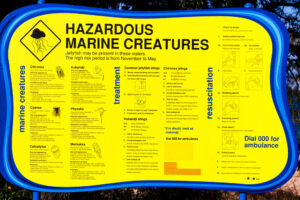The sun is shining, the waves are calling, and the tropical waters beckon you for a refreshing swim. But wait, before you dive in, there’s something important you need to know about – box jellyfish season. These translucent creatures might look delicate, but they pack a punch that can ruin your day if you’re not careful.
In this guide, we’ll explore the harms of jellyfish to humans and equip you with essential safety tips to ensure you have a worry-free time at the beach even during the stinger season.
Understanding Box Jellyfish
First things first, let’s get to know our stinging, gelatinous friends – the box jellyfish. These fascinating yet potentially dangerous sea creatures are known for their bell-shaped bodies and long, venomous tentacles. They may look ethereal as they float through the water, but their sting can deliver a painful experience that you won’t ever forget or for some, lethal.
Importance of Awareness and Safety During Box Jellyfish Season
As the warm weather and summer months arrive, the ocean becomes an irresistible playground, it’s essential to be aware of the risks associated with box jellyfish and even other marine stingers. Staying informed and taking safety precautions can make all the difference, especially on yearly reports of box jellyfish deaths.

Box Jellyfish and Their Dangers
Let’s dive deeper into the potential dangers posed by the stings of these marine creatures.
1. Painful Stings
A box jellyfish sting can cause immediate and intense pain. The venom released by their tentacles can leave you with a burning sensation, red welts, and throbbing discomfort.
2. Severe Allergic Reactions
In some cases, individuals may experience severe allergic reactions to box jellyfish stings, known as anaphylaxis. This can lead to difficulty breathing, a rapid drop in blood pressure, and a life-threatening situation.
3. Cardiac Arrests in Extreme Cases
Although rare, box jellyfish stings can lead to cardiac arrests or heart attacks due to the toxins affecting the heart. Quick and appropriate action is crucial to prevent such extreme outcomes.
When Does Box Jellyfish Season Occur?
Box jellyfish season isn’t a fixed period, but rather a time when the risk of encountering these creatures is higher. It usually coincides with warmer months, particularly in tropical and subtropical regions. In Australian Waters, box jellyfish season happens around October – November and April – May. During this time, species of jellyfish tend to migrate closer to shore or warm waters, increasing the chances of human encounters.
Reasons Behind Increased Jellyfish Presence During Specific Times
The reasons for heightened jellyfish activity are varied and complex. Factors such as water temperature, currents, and breeding cycles play a role in their movement. Being aware of these factors can help you anticipate when these venomous creatures be more prevalent.
Survival Guide on How to Stay Safe on These Killer Jellies
1. Safety Precautions Before Entering the Water
Checking Local Advisories and Warnings
Stay informed about local jellyfish alerts and advisories. If experts advise against swimming due to jellyfish activity, it’s best to heed their advice.
Consider Wearing a Full-Body Swimsuit or Wetsuit
Wearing a protective swimsuit or special stinger suit can provide an additional barrier between you and potential stingers.
Knowing Your Own Medical History and Allergies
Understand your own medical history and allergies. If you’re allergic to jellyfish stings or have a history of severe reactions, take extra precautions and consult a medical professional if needed.
2. First Aid for Jellyfish Stings
If you find yourself stung, follow these steps:
Stay Calm and Avoid Sudden Movements
During the initial sting, panicking can worsen the situation by causing more potent venom to be released. Stay as still as possible and exit the water safely.
Vinegar Application and Its Benefits
Vinegar is often recommended for box jellyfish stings. Pour vinegar on the affected area to help neutralise the toxins and tentacles.
Proper Removal of Tentacles
Gently remove any tentacles that may be stuck to your skin. Use a pair of tweezers or the edge of a credit card, avoiding direct contact with your hands.
Pain Management and Reducing Inflammation
Over-the-counter pain relievers and anti-inflammatory medications can help manage pain and reduce swelling. Applying a cold pack can also provide relief.
Seeking Professional Medical Help for Severe Stings
If you experience severe pain, difficulty breathing, or signs of an allergic reaction, seek medical attention immediately.
3. Lifesaving Measures and Emergency Response
In extreme cases, immediate action can be lifesaving for someone who had a painful encounter with a dangerous jellyfish.
Recognizing Severe Allergic Reactions (Anaphylaxis)
Symptoms of anaphylaxis include difficulty breathing, swelling of the face or throat, rapid drop in blood pressure, and loss of consciousness. If you or someone else exhibits these symptoms, seek emergency help and use an epinephrine auto-injector if available.
Performing CPR If Needed
In cases where a box jellyfish sting leads to cardiac arrest, knowing how to perform CPR can be crucial until professional help arrives.
Immediate Actions to Take in Case of Severe Stings
If you suspect a severe box jellyfish sting, call for help immediately. While waiting for assistance, elevate the affected area and keep the person as still as possible.
4. Post-Sting Care and Recovery
Monitoring the Affected Area for Signs of Infection
Keep an eye on the sting area for any signs of infection, such as increased redness, swelling, warmth, or discharge. If these symptoms occur, seek medical attention.
Avoiding Scratching or Rubbing the Sting Area
It’s natural to want to relieve the itchiness, but scratching or rubbing the sting can worsen the inflammation and potentially lead to infection.
Hydrating and Maintaining Overall Health
Drinking plenty of water and maintaining a healthy diet can aid in the healing process. Adequate hydration supports your body’s ability to flush out toxins.
5. Tips for Preventing Jellyfish Stings
Of course, prevention is the best strategy for these deadly creatures:
Avoid Swimming in Known Jellyfish Hotspots
If you’re aware of areas where box jellyfish are often spotted, it’s wise to avoid those locations during their active season.
Be Cautious in Murky Waters
Reduced visibility in murky waters increases the likelihood of accidental encounters with jellyfish. Be extra cautious and vigilant in such conditions.
Stay Clear of Floating or Washed-Up Jellyfish
Even if they appear lifeless, box jellyfish tentacles can still deliver stings. Keep a safe distance from any floating or washed-up jellyfish.
Swim With a Buddy and Keep an Eye Out for Each Other
Swimming with a friend can provide an extra layer of safety. Look out for each other and seek help immediately if someone gets stung.
Keep an Appropriate Distance from Fishing Lines and Nets
Box jellyfish can be attracted to fishing lines and nets. Stay away from these areas to avoid unwanted encounters.
Conclusion
As you prepare for a day of fun in the sun and sea, keep in mind that box jellyfish are part of the ocean’s delicate ecosystem. While their beauty is undeniable, their stings can be painful, dangerous, and even lethal.
Armed with knowledge and following these safety guidelines, you can enjoy the beach with confidence, knowing you’re well-prepared to face any potential encounters. So, keep your eyes open, stay cautious, and have a safe and enjoyable time at the beach even during box jellyfish season!

